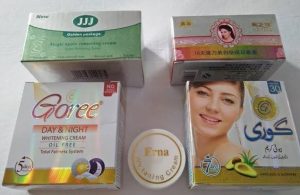Despite being banned, skin lighteners with illegal levels of mercury remain online, with many offered by the same e-commerce platforms where illegal products were previously found in 2019. This is the finding of new research by the Zero Mercury Working Group (ZMWG), a global NGO coalition working to eliminate mercury uses, releases and exposure.

Around half of the lighteners purchased on eBay, Shopee, Jiji and Flipkart platforms were found to contain mercury concentrations over 1 ppm, the legal limit established by many governments and the Minamata Convention on Mercury.
“Despite being illegal, our findings show the same high mercury skin lighteners continued to be offered for sale on the internet,” said Michael Bender, Mercury Policy Project Director and ZMWG Co-coordinator. “What’s illegal domestically should be illegal online. E-Commerce must be held to the same standards.”
Between 2017 and 2022, ZMWG conducted three separate investigations, each time confirming continued global access to illegal, high mercury skin lightening products. Most of the products sampled were manufactured in Asia, especially in Pakistan (43%), Thailand (8%), China (6%) and Taiwan (4%), according to their packaging.
Elena Lymberidi-Settimo, Policy Manager at the European Environmental Bureau and co-coordinator of ZMWG, said: “Mercury is a dangerous neurotoxin which must be effectively controlled. Internet platforms must stop these Illegal products from being sold on their sites…”
Products were tested in an accredited laboratory in the EU, after being screened using X-ray fluorescence (XRF) analysers in three regional hubs:
- CASE in Côte d’Ivoire (for Africa),
- Ban Toxics in the Philippines (for Asia) and
- In Antigua and Barbuda (for Latin America and the Caribbean.)
Dr. Shahriar Hossein, Secretary General and Senior Technical Advisor, Environment and Social Development Organisation (ESDO) from Bangladesh, member of the ZMWG, said: “These hazardous and illegal products pose a serious mercury exposure risk, especially to repeat users and their children. We welcome the opportunity to work collaboratively with the authorities to stop the toxic trade in high mercury skin lightening creams.”
In 2019, skin-lightening products bought online by SRADev Nigeria from Nigeria were tested for their mercury content, as part of a project by the Zero Mercury Working group (ZMWG). By the end of 2020, the Minamata Convention on Mercury requires each Party to ban the manufacture, import or export of cosmetics containing over 1 ppm (µg/g) mercury, by taking appropriate measures.
Between 2020 and 2021, a SRADev Nigeria continuous bi-monthly monitoring of the e-commerce sites shows that, skin-whitening creams identified as containing potentially dangerous levels of mercury continue to be sold online more than 2 years after the group raised the alarm on e-platforms run by Jumia-Nigeria, JiJi-Nigeria and Konga-Nigeria.
Dr Leslie Adogame, SRADeV Nigeria Executive Director and a member of ZMWG, said: “Despite these illegal high mercury products being essentially banned by governments around the globe, our testing and bi-monthly monitoring result shows the same products continuing to be sold locally and on the internet. In particular, E-Commerce giants are not above the law and must be held accountable.”
Moreso, the Minamata Convention provision on mercury-added cosmetics is already adopted into law by National Agency for Foods and Drugs Administration and Control (NAFDAC) of the Federal Ministry of Health in Nigeria. Consequently, the products sold by Jumia Nigeria, JiJi.com and Konga to customers in Nigeria are already illegal.
Since NAFDAC regulations apply to all advertisements and promotion of cosmetic products manufactured, imported, exported, sold, distributed or used in Nigeria, no person shall advertise a cosmetic product unless (1) the product has been registered by the Nigerian Agency of the Federal Ministry of Health; (2) The advertisement has the approval of the Agency.
Mr. Victor Fabunmi, SRADeV Nigeria Senior Programme Officer, said: “No doubt our extensive monitoring clearly shows that local markets ‑‑ especially internet platforms ‑‑ around the country are profiteering from the sales of dangerous, high mercury and often illegal products. E-commerce giants in the country have repeatedly failed to ensure that cosmetics sold by third-party sellers are free of toxic and illegal substances like mercury.”
Therefore, to address this growing challenge, “a coordinated compliance mechanisms are needed at the local, national, regional and global levels. In Nigeria, NAFDAC and Federal Competition and Consumer Protection Council (FCCPC) must now work collegially towards these unsafe products and accelerate their removal from commerce before they are sold to consumers, in order to improve consumer protection,” said Dr Adogame.
Mercury is used in skin lighteners as it inhibits melanin and results in a lighter skin tone. The regular use of skin lightening products (SLPs) containing mercury can lead to rashes, skin discoloration and blotching. Long-term exposure may damage the eyes, lungs, kidneys, digestive, immune and nervous systems.
Some 137 countries have committed to the Minamata Convention to phase out and limit mercury, including in cosmetics. A meeting for parties to that convention is being held in Bali later in March to map out steps to curtail additional mercury-added products and processes, and to reduce releases and exposures to mercury.
The ZMWG is an international coalition of over 110 public interest environmental and health non-governmental organisations from over 55 countries from around the world formed in 2005 and coordinated by the European Environmental Bureau and the Mercury Policy Project.
